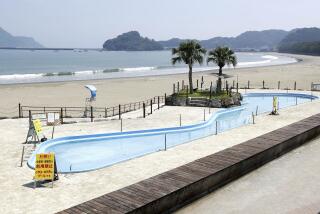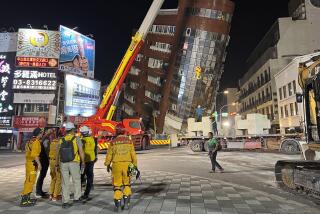Economic Shock Waves From Kobe Still to Come
- Share via
The killer earthquake that struck Japan’s industrial heartland Monday will cause ripple effects all across the global economy as manufacturers, financiers and real estate markets in the United States and elsewhere discover just how dependent they are on Japanese money and supplies, government and industry officials said Tuesday.
American electronics companies are likely to see disruptions in the supply of key computer chips and flat-panel display screens, resulting in higher prices and possibly product delays. U.S. homeowners and businesses will probably face higher insurance rates as the catastrophe further squeezes the global reinsurance markets.
*
Even such products as heavy construction equipment could be affected. Caterpillar Inc. said its joint venture plant in Akashi, near Kobe, has been temporarily closed because of damage. The company said competitors, which also have facilities in the area, could be hurt as well.
Real estate markets in Los Angeles and other areas with a high concentration of Japanese ownership may be hit if Japanese insurance companies fall short of cash and are forced to sell American assets to pay claims.
“Insurance companies will need cash,” said Michio Hamaji, head of the New York subsidiary of Japanese researcher Teikoku Databank. “They will sell their (overseas) real estate and bring the money back to Japan.”
Over the long run, however, the impact on Japanese investment in the United States could be just the opposite. Japanese insurance companies have long argued that they need to invest overseas to protect themselves in the event of a major disaster. A disaster of the scale that hit Tokyo in 1923, analysts say, would cause a plunge in the value of the yen, and insurance companies could then sell highly valued overseas assets to help pay off the claims.
Similarly, the Kobe quake could prompt a serious reassessment by Japanese corporations of the heavy concentration of financial and production assets in Japan’s earthquake-prone centers. Some analysts say it will speed Japan’s effort to diversify its production facilities overseas to reduce its vulnerability to such catastrophes.
On Tuesday, though, long-term fallout was not on the minds of company executives and analysts as they scrambled to assess the immediate impact of the quake. There are already signs that deliveries of key computer memory chips, now in short supply, will be held up. Japanese electronics giant NEC Corp. has closed its plant in Shiga, north of Kobe, pending an investigation of cracks in a building wall. There were reports of poisonous gases escaping from the plant.
Mitsubishi and Texas Instruments have also announced temporary halts in chip production at plants in the region while they check for problems and readjust sensitive chip-making equipment. There are at least 10 other major semiconductor plants in the region that could account for a small but key portion of world memory production.
“The equipment is precisely calibrated to widths of one-200th of a human hair,” said Daniel Klesken, analyst at Robertson Stephens & Co. “It takes time to recalibrate and repair the equipment.”
Disruptions in the lives of workers will also affect production, Klesken said: “The potential for production delays measures in the weeks or even months.”
Stock prices of U.S. chip makers rose Tuesday on the possibility that reduced supply out of Japan in the midst of a worldwide shortage could push up prices of these key computer components.
Also affected could be deliverers of the flat-panel displays used in portable computers. The sector’s largest players, including Sharp and Hoseiden, are headquartered in Osaka, near Kobe.
A serious delay in deliveries of flat-panel displays could disrupt U.S. production of everything from laptop computers to Boeing 747s, which use the displays in their cockpits, said David Mentley, an analyst at San Jose-based researcher Stamford Resources.
Sharp, the world’s largest maker of flat screens, is trying to calm such fears. The company said in a letter to customers that its two factories in the area are operating normally. However, Hideaki Miuri, from the company’s marketing group, sent customers a letter noting that “deliveries of the products have definitely been affected by road and rail damage, flight delays and the shutting down of customs.”
Fujitsu said Tuesday that it temporarily shut down a display plant in Akashi because the earthquake had damaged one of its buildings. A spokeswoman at Compaq Computer said it would be premature to assess the impact of the temblor on Compaq’s access to key supplies for making computers.
With the economy of the Osaka region tightly integrated, disruptions in power, transportation and key production materials such as steel could also affect production of consumer electronics products for which the region remains a major supplier.
At Mitsubishi Electric America in Cypress, Chief Executive Tachi Kiuchi said the company expects product delays of up to several weeks while Japanese factories and power lines damaged by the quake are repaired.
“Number one, nobody (in the company) died, and number two, all the buildings are OK,” Kiuchi said. “But equipment-wise, we have had extensive damage.”
Supply disruptions will be far fewer than they might have been even a few years ago, thanks to increased overseas production by Japanese companies and the rise of Korea as a new production base for key memory chips. Still, there are many obscure materials and components for which world manufacturers depend on a few major Japanese suppliers.
Insurance losses from the quake will be limited by policies that require the government to cover a large portion of the losses from home damage in catastrophes of this magnitude, while Japanese companies are seldom covered for earthquake damage.
Even so, losses will be substantial. Towa International, a Japanese investment bank, told Reuters that the death toll and damage “suggest a far worse catastrophe than Los Angeles.” The bank estimated total losses of $40 billion to $60 billion.
Even if only a portion of those losses are insured, the reinsurance companies agree to bear part of an insurance company’s losses in exchange for a cut of the premium. This allows primary or direct insurers such as Allstate Insurance Co. or Farmers Insurance Group to cap their potential losses from any one catastrophe.
Regardless of whether the insurance loss toll from Japan exceeds the $10 billion from the Northridge quake, Sean F. Mooney, chief economist of the Insurance Information Institute, said he expects the impact on the markets to be greater because of the images of destruction that have been broadcast globally.
“Even if the dollars are small, the perception is very big,” he said.
*
Times staff writers Tom Mulligan and Ross Kerber contributed to this report.
* JAPANESE ECONOMY
Quake will cost billions but could boost economy. A8
* ON-LINE HELP
How to get information about the earthquake by PC. D4
* MAIN STORY: A1
More to Read
Inside the business of entertainment
The Wide Shot brings you news, analysis and insights on everything from streaming wars to production — and what it all means for the future.
You may occasionally receive promotional content from the Los Angeles Times.










